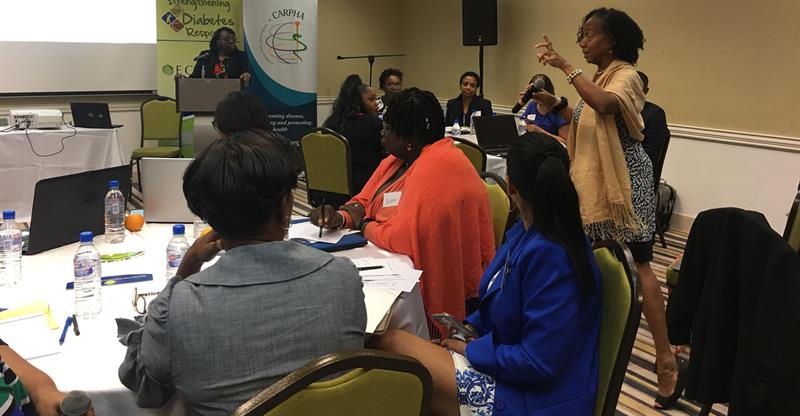THE WORKSHOP SOUGHT TO IDENTIFY MATERIALS AIMED AT INCREASING AWARENESS OF NCDS.
 Over 35 healthcare and communications professionals from 25 Caribbean countries met in Curaçao from April 29-30 to finalize a regional strategy aimed at the prevention and control of non-communicable diseases (NCDs) – the number one cause of death in the Caribbean.
Over 35 healthcare and communications professionals from 25 Caribbean countries met in Curaçao from April 29-30 to finalize a regional strategy aimed at the prevention and control of non-communicable diseases (NCDs) – the number one cause of death in the Caribbean.
The two-day workshop, facilitated by the Organization of Eastern Caribbean States (OECS) Commission and the Caribbean Public Health Agency (CARPHA), was co-funded by CARPHA and the World Diabetes Foundation and sought to identify and adapt a pool of effective information, education and communication (IEC) materials aimed at increasing awareness and communication on NCDs in targeted populations and communities within the OECS/CARPHA Member States in the Caribbean.
Lydia Atkins, Programme Officer for Health at the OECS Commission, highlighted the importance of informed messaging in influencing behavioral changes and the need for collective action to effectively harmonize messages and public health campaigns in the region.
“Research has consistently shown that evidence-based communication programmes can increase knowledge, shift attitudes and cultural norms and produce changes in a wide variety of behaviors,” she said. “This strategy has proven effective in several health areas, such as increasing the use of family planning methods, preventing HIV and AIDS and improving maternal and child health.”
“Under the recently approved World Diabetes Foundation grant for the ‘OECS Diabetes Prevention and Care’ project, the OECS will be implementing a year-long Mass Media Campaign which aims to go beyond the delivery of a simple message or slogan to encompass the full range of ways in which people individually and collectively convey meaning. The campaign will implement the effective use of key IEC materials in the mass media, community-level activities and the everyday interpersonal communication with healthcare providers.”
Atkins also noted that the Social Marketing Strategy for the Project will provide a twelve (12) month comprehensive road-map for achieving increased awareness and communication on type 2 diabetes and its consequences among various stakeholders throughout the region, and to sensitise citizens to take appropriate action for the care and prevention of diabetes.
Key outcomes of the meeting were: a finalized selection of Key IEC Messages to be used in the Mass Media Campaign; the identification of Target Audiences for the Key IEC Messages; the adaption of culturally appropriate and effective pre-existing IEC materials to promote diabetes awareness and adoption of healthy lifestyles; and a finalized strategy for a yearlong Mass Media Campaign.
The OECS Commission will continue to work with partners such as CARPHA, the Pan American Health Organization (PAHO) and the World Health Organization (WHO) to align strategic approaches to improve diabetes care and cardiovascular health in member states.